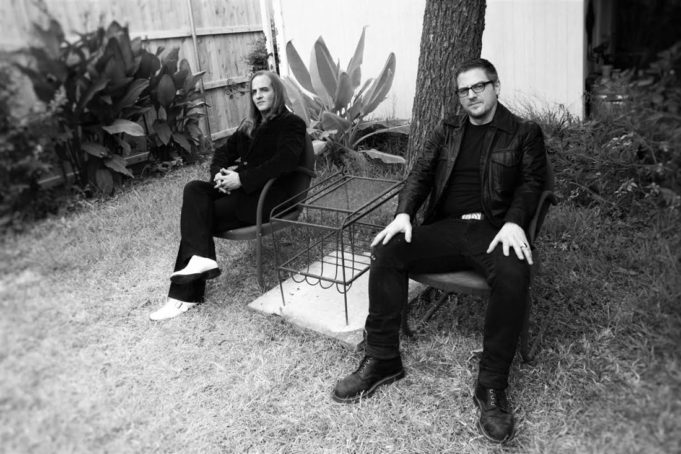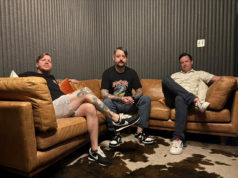The year 2014 was a good one for Fort Worth’s heaviest, noisiest experimental duo. In the spring, Pinkish Black completed a West Coast tour with Italian progressive rockers Goblin, kindred spirits whose soundtracks for ’70s horror films like Suspiria inspired and influenced singer-keyboardist Daron Beck and drummer-synthist Jon Teague. Then the band was dropped by Century Media, the European label that released Pinkish Black’s critically acclaimed sophomore album, Razed to the Ground, a year earlier (and that has since been acquired by Sony).
“The Century Media deal lasted about as long as we thought it would,” Beck said, sitting with Teague at my house the other day, “but it was beneficial in the long run.”
“It served its purpose by putting us on a lot of people’s radar,” Teague said.
Unlikely Calvinists, Beck and Teague fell back on the work ethic that had sustained them through the loss of loved ones and collaborators, keeping their focus on the future, writing new material and maintaining a busy live performance schedule, and mixing local shows with short out-of-town runs.
Their efforts paid off: In December, the duo inked a deal with Relapse Records, a venerable heavy-music label that’s been around for a quarter of a century, an eon in record-label years.
After a week in The Echo Lab studio in Argyle last February with ace engineer Matt Barnhart (Brave Combo, The New Year, Shearwater), the band produced its third full-length album. Relapse will release Bottom of the Morning on Friday, Oct. 30, the eve of Pinkish Black’s favorite holiday.
Locally, the band will launch the new album on Halloween night at The Chat Room Pub, with Baltimore’s Curse and Dallas’ Nervous Curtains (part of whose new album, Con, was produced by Beck). Last year, the duo dressed up as French operatic space rockers Magma. This year, who knows? Next week, Beck and Teague will head off on a two-week jaunt through the Midwest and East Coast.
Relapse, as if to demonstrate its confidence with and commitment to the band, is simultaneously releasing The Trouble with Being Born, the last recordings from Pinkish Black’s predecessor band, The Great Tyrant. Both musicians agree that the label is a better fit than Century Media for their sound.
“Looking at [Relapse’s] roster,” Beck said, “there are a lot of bands –– Zombi, who we’re touring with next month, Goblin, True Widow –– that aren’t metal the way we aren’t.”
Pinkish Black’s category-resistant sound builds on dark rumbles of distortion from Beck’s keyboards, propelled by Teague’s inexorable rhythms, with high synth wails that quiver like voices in terror. “Brown Rainbow,” the single from Bottom of the Morning, serves as a handy compendium of Beck and Teague’s sonic signatures and an ideal intro for non-initiates. Beck’s baritone is a highly expressive instrument, as lucky listeners have heard on those occasions when Pinkish Black has covered Prince’s “The Beautiful Ones” onstage (with Frank Cervantez of Wire Nest on guitar). On “Everything Must Go,” though, his voice is deliberately masked by effects and buried in the mix for heightened dramatic effect, a sinister whisper that grabs unsuspecting listeners and drags them into a sonic web.
“On our first album, we were emotionally and auditorily in a cave,” Beck said. “We shrouded everything in reverb and saturation to sound as big as possible, while hiding our insecurities about performing as a duo. On [Razed to the Ground], we were figuring out how to write for this format, and the mood is more hopeful on songs like ‘Ashtray Eyes’ and ‘Rise.’ ”
“On the new album,” Teague said, “we were more conscious of trying to write a song from beginning to end, rather than putting different parts together.”
“While it’s lyrically one of the darkest things we’ve done,” Beck said, “it’s also prettier and moves into some emotional areas we haven’t gotten to before.”
With the release of The Trouble with Being Born, all of the material written with bassist Tommy Atkins –– whose suicide in early 2010 necessitated the transition from Tyrant to Pinkish Black (“Tommy Atkins (1974-2010),” March 3, 2010) –– is now available to the public ear. Atkins was a shy man whose diffident exterior masked strong passions. No one who experienced The Great Tyrant live will ever forget the deep, reverberating tone of his bass –– a musical monolith that listeners felt through their heels and solar plexuses rather than just hearing. That sound is in full effect on The Trouble’s “Softly, Everyone Dies,” on which Beck’s keyboards roil with symphonic Sturm und Drang, and the singer delivers his most stunning recorded vocal to date. The album’s title track is a potent reminder of the trio’s fierce power.
“I’m really glad this record is finally out,” Beck said. “We weren’t ready to stop playing this music five years ago. But we had no choice.”
He and Teague have played “Handholder” from the new Tyrant album live, and they may include it and another song from the album in future Pinkish Black sets.
Looking down the road, Teague said, “We want to go to Europe.”
“And we want a really good director to make a really good film using our music,” Beck said. “Then this will be sustainable, and we’ll be able to go on the road without worrying about our electricity being turned off when we get back.”












